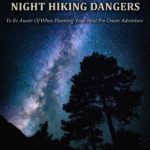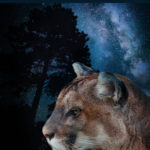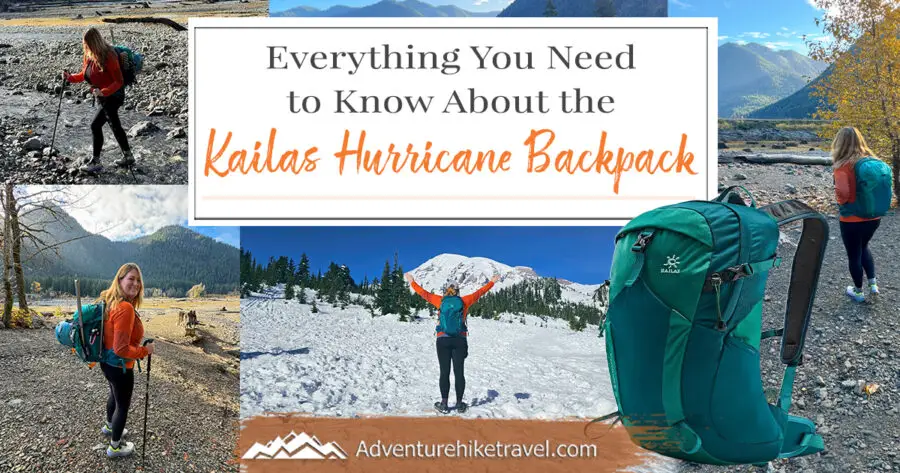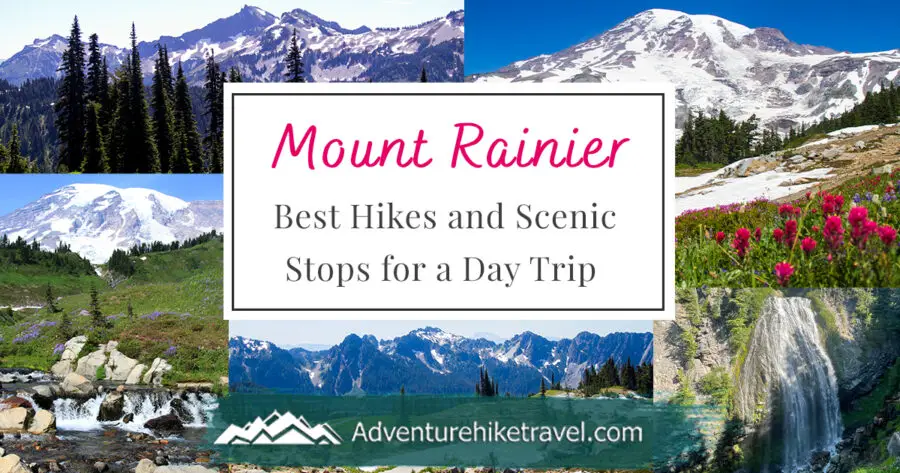Night Hiking Dangers To Be Aware Of When Planning Your Next Pre-Dawn Adventure
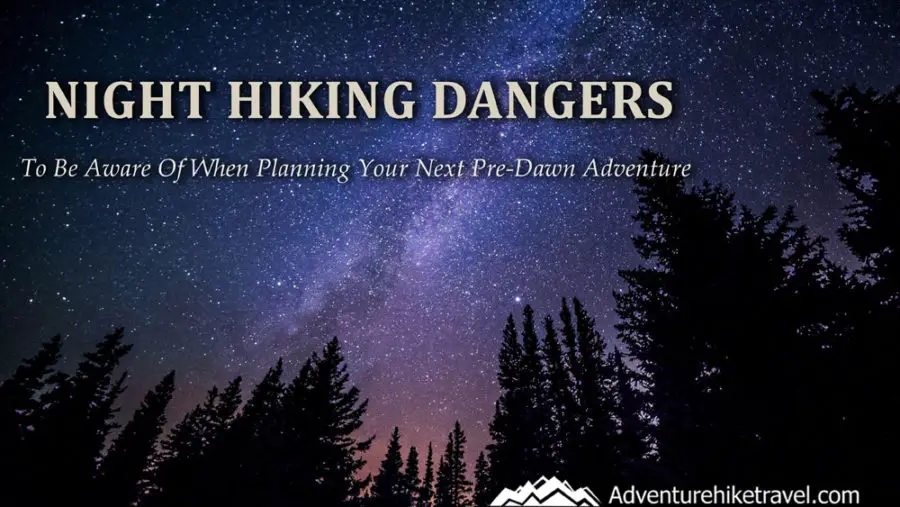
There is just something completely exhilarating about hiking at night. With your sight limited all your other senses are heightened. Every rustle of brush, every tree creak, and every little noise is amplified. You get the peace and quiet without the usual trail bustle from other hikers passing you left and right. The stunning views of the stars and seeing the outlines of mountain peaks lit up from moonlight can feel unreal. Although beautiful, hiking at night presents its own kind of dangers and should be prepared for accordingly. To help keep you safe on the trail we have gathered some Night Hiking Dangers To Be Aware Of When Planning Your Next Pre-Dawn Adventure.
Night Hiking Dangers To Be Aware Of
When Planning Your Next Pre-Dawn Adventure
Tripping or Falling.
Probably the number one danger to hiking in the dark is tripping over roots, rocks or other hazards from the lack of visibility. Many hikers have fallen down cliffs, gotten twisted ankles or worse while hiking. Being stranded in the dark for hours in freezing conditions at risk of hypothermia with no one else coming up the trail to help is highly risky. Having people with you who can have your back in case of an emergency can give you peace of mind while you hike.
Getting Lost
Aside from injuries from stumbling in the dark one of the most common risks to night hiking is losing the trail. At night it is much easier to make mistakes. With limited visibility, it is easy to miss a crucial trail marker, spur pathway, or accidentally start following a path made by a deer or goat. This can send you wandering off into the back country where you are suddenly scratching your head on how you ended up so off course. Out of all the dangers listed, becoming lost can be the most perilous.
Weather Conditions
After nightfall, temperatures, especially at higher elevations, can drastically plunge. This makes for more dangerous conditions if you start out your hike expecting for temperatures to remain consistent and get caught unprepared. It’s good to over-prepare for a night hike and bring extra layers that you can add on or take off as needed. Aside from colder temperatures a night hiking danger to be wary of is fog. Sometimes during pre-dawn hours there can be white-out fog conditions clinging to the high mountain peaks making it very easy to lose the trail. Getting caught in a rainstorm while hiking is never fun, but getting caught in one on a night hike can be more perilous than during the day. For one, there’s no sunlight to help dry you off. Second, being a drenched rat during the cold of night puts you at a higher risk for hypothermia. Third, sudden downpouring rain at night can also make it very easy to lose the trail or even erase trail markers. Getting caught in a snowstorm during the day is bad enough, now try imagining finding your way back down the mountain in the dark during a blizzard.
People
An additional concern for hiking at night is other human beings. Most hikers I have run into on the trail are amazing people, but you never know what sorts of humans you may run into. There's good and bad out there and hiking with a fun group you trust is much safer than being alone in the middle of nowhere and potentially running into a creepy Ted Bundy type serial killer or potential axe murderer. Hey You Knever Know!
More realistically than running into a sinister creeper in the woods the most likely danger from humans while out hiking at night is getting accidentally shot by a hunter. Many trails during the end of the summer months and through the fall are filled with hunters hunting deer or other game. To avoid getting accidentally shot by a novice with a twitchy trigger finger, make sure you are wearing a headlamp and talking loudly and preferably wearing bright reflective colors.
Wildlife
Then there is wildlife. Hiking at night significantly increases your chances of running into wild animals. Even if a trail is mostly void of wildlife during the day, night may be a different story. Animals that are scared off from crowds of people during daylight hours might venture back into popular destinations when its sundown. Nocturnal predators such as mountain lions are most active from dusk till dawn. Even though cougar attacks are rare, going into their domain during their prime hunting hours alone is not a decision I would do. If you are hiking in a desert it may also be harder to spot rattlesnakes and scorpions in the dark.

Personal Night Hiking Wildlife Experience - By Samantha Panzera
A few years ago, I was hiking with some friends at 3 am in the morning to get an early start going up the Brothers in the Olympics. We were almost to Lower Lena Lake when I saw a tan blur shoot across the trail. Not long after we heard the most chilling, raise-the-hair-on-the-back-of-your-neck sounds from higher up.
The sounds came from above us on the left side of the trail where there was a steep hillside. We heard this high pitched whistling and some loud chirping, almost like a bird but different. There were no birds at that hour and it didn’t explain the other loud drawn-out whistles almost like an elk but not quite. The tan blur I saw dart across the trail in front of my headlight was extremely fast and silent. Even though I only caught a glimpse of it, I do not believe it was a deer. It was too low to the ground, almost at my hip level. For several minutes we flashed our headlamps up the hill, clapped our hands, clanged our trekking-poles together, yet we still had that spine-tingling feeling of being watched. Minutes would go by, then we would hear more whistles and chirping sounds so we stayed put for a bit, talked loudly, and shouted random things including, "Hey Bear!" Even though we knew whatever was up there was most assuredly not a bear!
We were almost certain that what we were hearing was a mountain lion, but it wasn't until we got back from our hike and listened to mountain lion sounds on Youtube that we were 100% positive that there was unquestionably a mountain lion sitting on a cliff watching, chirping, and whistling at us in the dark. Nerve-racking to say the least.
Watching videos of mountain lions after the fact, reminded me of how my housecat would always sit hunched over in front of the window staring longingly at birds with razor-sharp attention. My cat, in her bird hunting excitement, would make these exuberant chattering and chirping sounds while staring down her prey. Chilling to realize that mountain lions act similar to their smaller domesticated cousins and that during that night hike, I was the prey being watched.
I'm grateful that experience happened while I was with others and not while hiking alone. Even though I know wild animals will mostly just run away giving you a fun story to share with family and friends, I recommend hiking with others.
Below are some links to different Youtube videos with Mountain Lion sounds for in case you may want to familiarize yourself with some of the types of sounds they make before you go on your next night hike.
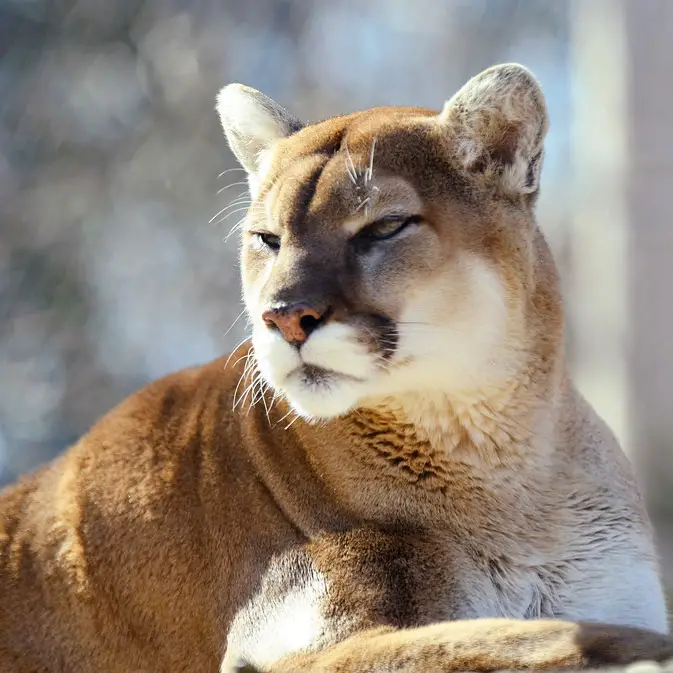
Mountain Lion Sounds on Youtube
In Summary Go With Others
My recommendation to anyone doing any hiking after dark is to find friends to hike with and play it safe even though statistically you are most likely to injure yourself from tripping over a root than being eaten by mountain lion. Just for saving your sorry-root-tripping-self, go with others.
Why Plan a Night Hike?
Now that we have gone over night Night Hiking Dangers To Be Aware Of
When Planning Your Next Pre-Dawn Adventure, you may be wondering why hike at night?
Gorgeous Sunrises or Sunsets
By hiking at night you can see some absolutely stunning vistas that light up with beautiful colors from the golden hues of a sunrise or sunset.
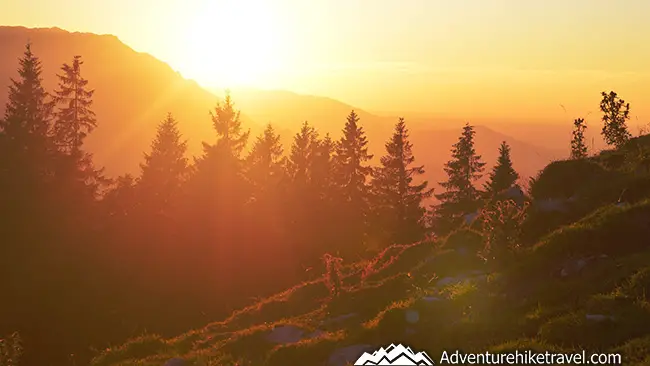
Stars
When hiking at night you can get away from all the light pollution and see the most amazing views of the Milky Way Galaxy. Some of the most stunning night sky experiences I have ever had were on backpacking trips or night hikes.
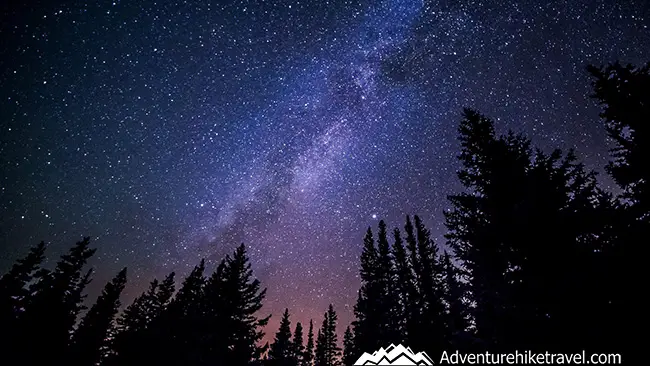
Avoid the Heat
I have personally done several sunrise hikes with the goal in mind to make it up the mountain and get back down to avoid hiking in 90 degree weather. When it’s super-hot out in the summer trudging uphill for hours is a bit less enjoyable.

Do a longer Day Hike
By starting a hike earlier in the dark and continuing on to arrive back at your car by sunset or even when it’s dark again, you can log in more miles. You can hike in one day a hike that may generally be considered mostly a one night backpacking trip.
Now that you are aware of the dangers to doing a night hike you can plan accordingly so you are better prepared for your own night time adventure.
Other Blog Post's You May Like
Myrtle Falls & Edith Creek – Paradise Mt. Rainier
Narada Falls (Paradise Mt. Rainier Hikes)
Franklin Falls Easy Beautiful Winter Hike Near Seattle
Marymere Falls – Easy Hike in Olympic National Park
25 Gift Ideas For People Who Love Travel
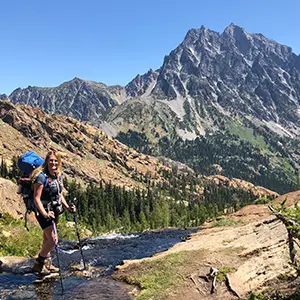
Want To Fill Your Life With Adventure?
Join our newsletter for an adrenaline-fueled journey! Receive exclusive updates on travel tips, gear reviews, epic hikes, captivating stories, and inspiration to turn your dreams into reality.
Don't just dream it, live it! Get Out There!


